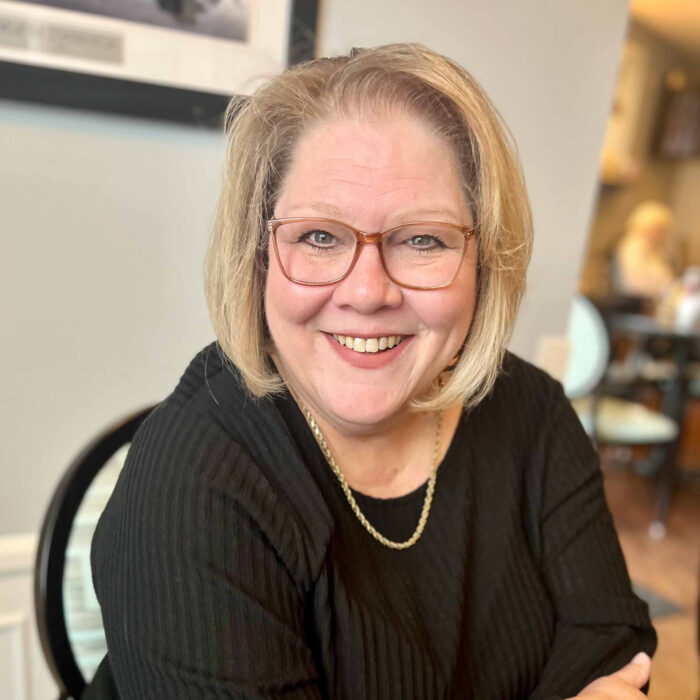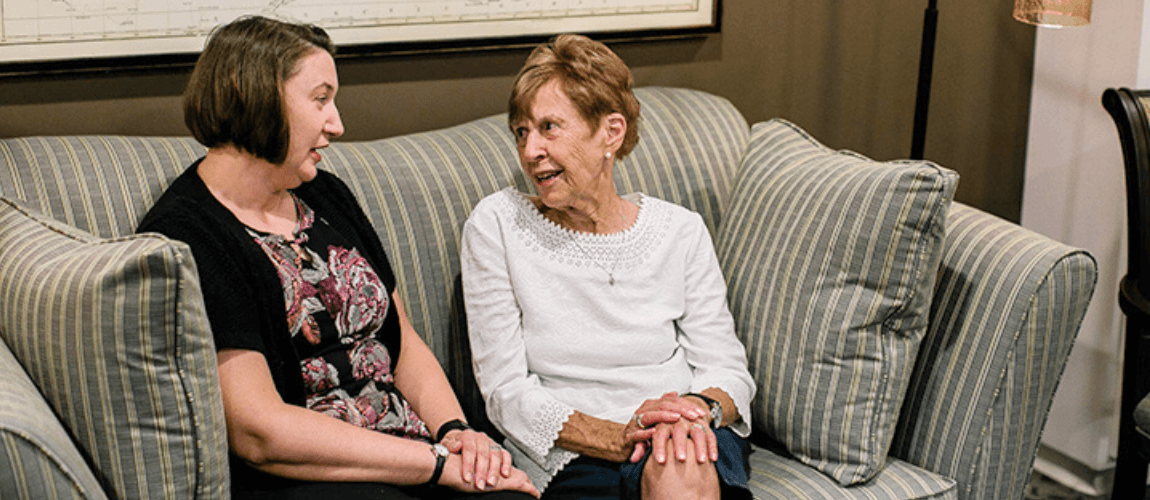Compassion comes straight from the heart. So when you find out that your aging parent, grandparent or loved one needs care, it’s natural to want to jump in and help. Just as they supported you throughout your life, now it’s your turn to reach out and extend a caring hand.
As you begin your caregiving journey, know that being a caregiver can feel both difficult and rewarding. Handling the demands of day-to-day care can be overwhelming at times, but our expert tips are here to help!
Here are some essential dementia caregiver tips to help you feel more confident in your ability to best support your loved one and manage this new chapter, together.
Daily Care Tips
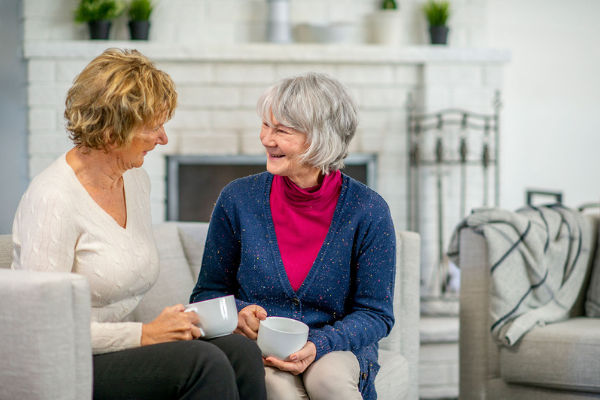
With Alzheimer’s and dementia, your loved one is experiencing changes in the way they think which affects their behaviors, daily life and activities. Do your best to respond with affection and reassurance. Here are just a few tips for dementia caregivers to help with daily care:
- Speak slowly in a reassuring tone. Understand that people with dementia often need clear, one-step communication. Set a positive mood by speaking to your loved one in a clear and gentle tone. Use simple words and sentences. For example, tell your loved one what you are going to do, step by step while you help them get dressed.
- Keep a to-do list or planner. Dementia makes it difficult for your loved one to remember events. Keeping a calendar or planner can help you stay on top of important appointments and activities.
- Monitor medications. Be sure to make note of each medication and what it does. Try color-coordinating to match the bottle with its designated slot on the schedule. It’s important that the medication list and schedule are clear to understand, especially if other family members are acting as caregivers as well.
- Focus on mealtime. Try to serve meals in a consistent, familiar place and eat at the same time as your loved one. Establishing a mealtime routine and eating with family can be a source of comfort for them. Some seniors may experience a loss of appetite or unwanted weight loss. If you eat with them, they may feel encouraged to eat more which can help keep them healthy.
Tips to Maintain An Active Lifestyle
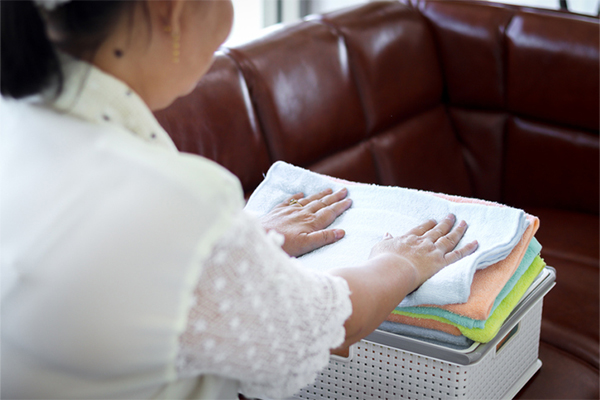
Try tailoring activities to your loved one’s interests and talents. Seniors with Alzheimer’s disease or dementia want to stay active and feel fulfilled, just like everyone else. Whether they’ve changed with their diagnosis or not, having your loved one participate in activities is a great way to enrich their lives and can help combat their symptoms, too.
Here are our top tips for dementia caregivers to help your loved one stay healthy and active for as long as possible.
- Establish a routine. Think historically about your loved one’s routine — did they prefer baths or showers? What was their favorite type of movie genre? Was there a favorite scent or laundry detergent they always used? Adopting — as much as possible — their past routine can stir up positive memories and provide comfort.
- Give them choices. Allow your loved one to choose for themselves as much as they can — support their independence and ability to care for themselves by giving them opportunities for simple choices. For example, allow them to pick between applesauce or green beans as a side dish at dinner.
- Plan activities. Keeping your loved one healthy and involved in activities is crucial as they navigate through this new stage of life. Try planning activities that can stimulate their senses like aromatherapy, engaging with a busy board, or doing low-impact exercises. Check out our list of the best activities for seniors with dementia to engage your loved one.
- Have them help with familiar activities. Someone with dementia may not be able to access their memories, but familiar activities, parts of their daily routine like household chores, can provide a lot of comfort. Folding laundry, sorting clothes, doing the dishes and projects around the house may have been a huge part of your loved one’s life, and there are ways to make these familiar activities accessible
Related: 9 Best Activities for Dementia Patients According to Experts
Home Safety Tips
To give you and your family peace of mind, you can take steps to make your loved one’s home a safer place. Minor home modifications can help your loved one move around independently and safely. Here are a few home safety tips to try:
- Remove confusing patterns or textures. Remove curtains and rugs with busy patterns that may be confusing to someone with dementia.
- Take steps to prevent falls. Remove any potential tripping hazards like cords or small rugs and be sure to keep the walkways clear.
- Update your list of emergency numbers. Be sure that all family members are up-to-date with emergency contacts and doctors office information.
- Consider lighting. It’s important to brighten spaces so your loved one can see where they’re walking or any items they’re looking for. Be sure that outdoor areas have good lighting as well. Some seniors in later stages of dementia may tend to wander, so having motion-activated lights around doorways leading outdoors can deter wandering and keep your loved one safe.
Related: Fall Prevention Strategies: A Room by Room Guide
When To Seek More Assistance
It’s easy to think that your loved one deserves the best care, and it’s up to you to do it all yourself – it’s our kind-hearted human reaction. Know that many caregivers experience burnout, that you are human, and the time will come when you need a break.
For a brief reprieve from caregiving, respite care can help give caregivers the reassurance they need to take a well-deserved break from providing 24/7 care. With respite care, a trained professional steps in and takes over for the family caregiver for a short period.
It’s helpful to educate yourself about dementia symptoms, and what to expect as the disease progresses. For caregivers, it’s important to recognize the signs your loved one may need more care. If you think it may be time to move your loved one into a memory care community, be sure to do your own research and ask the right questions. Professional caregivers will work with you on this journey to provide your parents with the best care.
At StoryPoint, We’re Here to Help
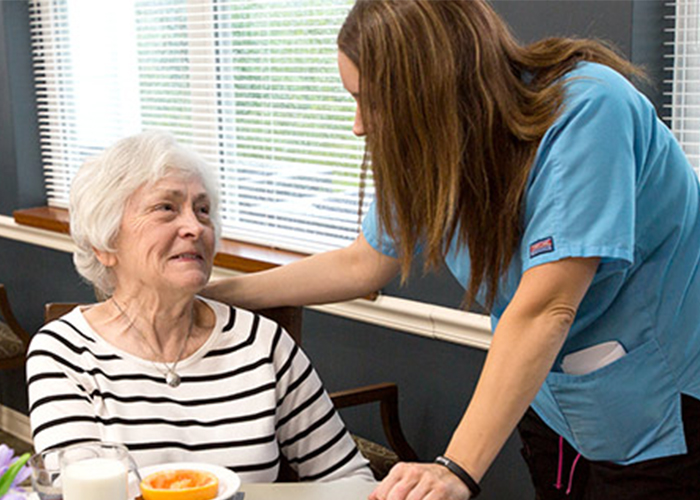
At StoryPoint, we specialize in activities for patients with dementia and enriching the lives of those with memory impairments. In our memory care neighborhoods, our professionally trained team is here to support your loved ones and help them make the most of every day.
Our unique memory care services include:
- Designated Directors of Connection Points who are dedicated to serving the seniors and families of our memory care neighborhood.
- 24-hour licensed support in all areas of living, wellness, dining and more.
- Specially trained employees equipped to navigate the effects of memory impairments.
- Specialized programming that meets residents where they’re at to ensure comfort while promoting an active lifestyle and opportunities for social connections.
- A dedicated memory care committee made up of company leaders that implement the latest, innovative memory care methods to ensure the best care for our residents.
- Thoughtfully designed elements such as high ceilings and enlarged windows to combat the effects of memory loss and dementia.
We know it can be difficult when your loved one begins experiencing dementia, Alzheimer’s, or other memory impairments. We’re here to guide you through this journey and help you find the right care for your loved one. Call our caring staff at 1-855-407-8679 to speak with a Community Specialist today.







